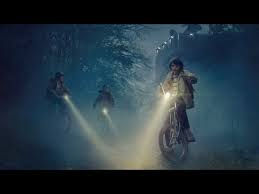What's Not So Strange about Stranger Things
- Feb 4, 2017
- 2 min read

Stranger Things was an immediate hit for Netflix when it debuted last year. Part of the attraction was the show's nostalgic look back at the eighties, coupled with an homage to classic horror films of the time period (anyone who doesn't see similarities between Eleven and the young girl at the center of Stephen King's Firestarter isn't looking very hard). But what's not so strange about Stranger Things is why this story resonates with people. At its center, this is a show about friendship.
In Stranger Things, four kids band together to find their missing friend and face down evil. This enduring theme of young outcasts saving the day by learning that they are more powerful together than alone is a staple in horror and fantasy stories. One could point to two stories that clearly had a profound impact on the shaping of Stranger Things: The Goonies, with its cadre of pre-teens embarking on great and terrifying adventures, and Stephen King's IT, in which a group of childhood friends deemed "The Loser's Club" face off against a creature that embodies their worst nightmares. (On a side note, it's an interesting development of synergy that one of the child stars of Stranger Things will be appearing in the upcoming film version of IT). We see it embraced in more recent stories as well, such as the "Scooby Gang" in Buffy the Vampire Slayer or the heroic trio of Harry, Ron, and Hermione in the Harry Potter series. (It also, to throw in a shameless plug, happens to be the theme at the center of my book, The Haunting of Jessica Kane).

The attraction of this theme lies in its mixture of nostalgia and hope. Childhood is a time when we first experience that yearning for relationships outside the boundaries of our family. Perhaps we have a deep-seated intuition that the world outside isn't always friendly and we will need faithful companions to traverse it safely. Then as we get older and become more mobile, we may lose touch with friends or find our time co-opted by the demands of new family relationships and our own children. What a show like Stranger Things does is call us back to that simpler, more innocent time when friends defined us and gave us the courage to face our fears. But as stories like this get us to look backwards to a simpler time, they also instill in us a hope for the future. They grant us confidence that when facing the terrors of life--illness, death, terrorism, irrelevance, failure--we can know that we are strongest when in the company of friends. One person standing alone against the world is a martyr. One person standing in the company of friends is a force to be reckoned with. And that's not strange at all.












Comments